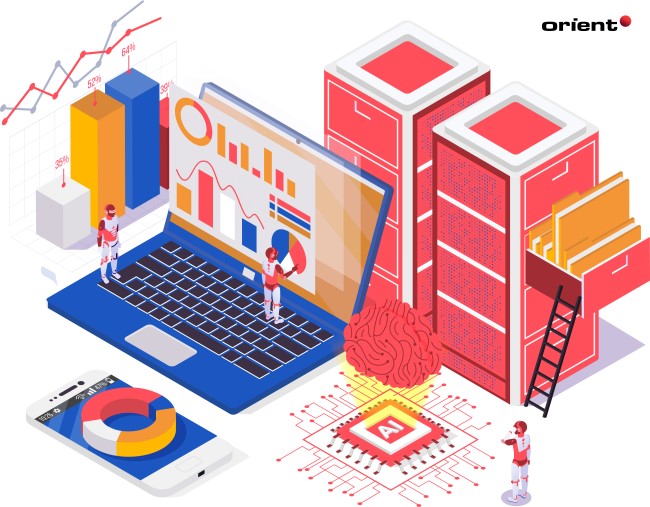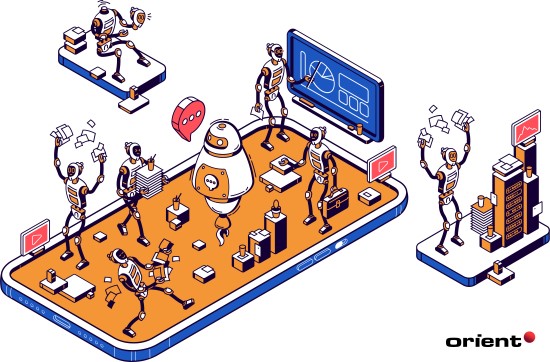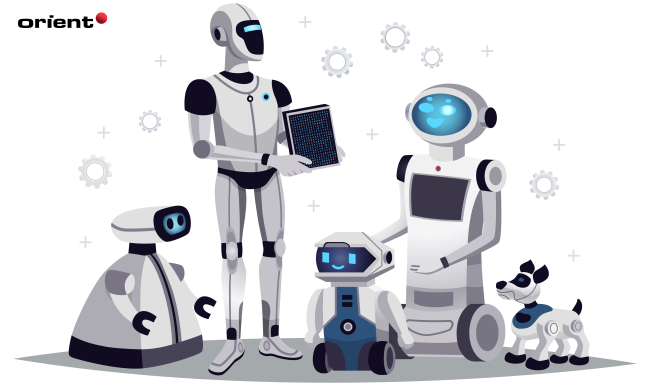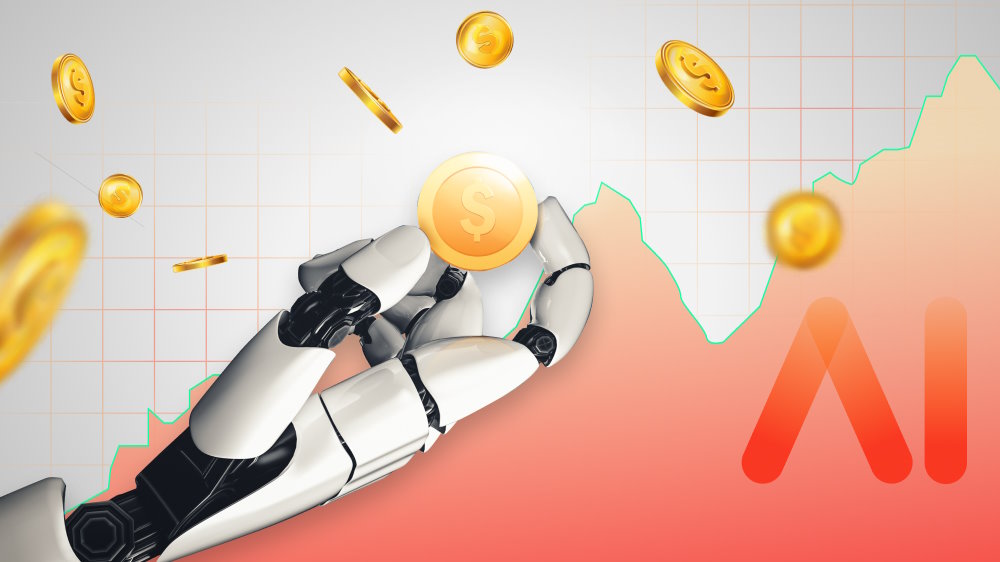RPA Explained: The Role of Robotic Process Automation in Digital Transformation

Content Map
More chaptersAs many businesses strive to keep up with the ever-changing digital landscape, many are turning to RPA as a key ingredient in their digital transformation strategies. Robotic process automation (RPA) is revolutionizing the business world by automating routine, manual tasks with the support of software robots.
Software robots are computer programs that are applied to automate a lot of tasks normally performed by humans. The term software robots are more widely used in the financial service industry. In other industries, this term is synonymous with robotic process automation.
RPA supports digital transformation by making processes more efficient and streamlined, freeing up employees to work on more strategic projects. That’s what we hear people talking about RPA and its role in embracing digital transformation for businesses of all sizes. So, what does RPA mean on the road to achieving the digital transformation of your business? We are about to find out in this article.
What Is Robotic Process Automation (RPA)?
Robotic process automation (RPA) is a form of business process automation technology based on software robots or artificial intelligence (AI) workers. Simply put, RPA allows employees to configure software, or a “robot,” to automate mundane tasks that human employees have previously performed. RPA enables organizations to improve efficiency, accuracy, and compliance by automating business processes. With RPA tools, you can automate repetitive tasks and rules-based processes across any application, system, or website. This includes tasks such as data entry, form filling, data mining, processing and decision making, and more.
There are many different RPA tools available on the market, each with its own unique capabilities. Some of the most popular RPA tools include UiPath, Automation Anywhere, Blue Prism, WorkFusion, Pega Robotics.
How Can Robotic Process Automation Benefit Your Business?
Robotic process automation, or RPA, is one of the most talked-about technologies in business today. And for a good reason: RPA has the potential to transform the way businesses operate, automate manual and time-consuming tasks, improve efficiency and accuracy, and ultimately reduce costs. Here, we are about to look at some of the typical business benefits RPA can offer you, and they are also the reasons for its increasing popularity:
Increased Efficiency & Productivity
As mentioned before, RPA can automate manual, time-consuming, and repetitive tasks, freeing up employees to focus on higher-level work. This can lead to increased efficiency and productivity across the business as a whole.
Enhanced Accuracy
By automating tasks that are susceptible to human error, RPA can help improve accuracy and consistency across the business.
Reduced Costs
RPA can help businesses save money by reducing the need for manual labor, increasing efficiency, and improving accuracy.
Improved Customer Satisfaction
By automating tasks that customers typically have to wait for, RPA can help improve customer satisfaction levels no matter what industries your company is in.
Increased Compliance
RPA can help businesses ensure compliance with regulations by automating tasks such as data entry and documentation.
Improved Data Quality
By automating tasks such as data entry and validation, RPA can help improve the quality of data.
Faster Turnaround Times
By automating time-consuming tasks, RPA can help businesses achieve faster turnaround times for data entry and documentation, leading to improving business outcomes.
Greater Scalability
RPA can be scaled up or down to meet the changing needs of a business, making it a highly flexible solution.
Increased Agility
RPA can help businesses respond quickly to changes in the market or business environment by handling data entry and documentation.
Improved Insights
With RPA, businesses gain insights into their operations by taking care of tasks such as data collection and analysis.
How Does RPA Support Digital Transformation?
What Do We Mean by Digital Transformation?
At its most basic, digital transformation is the integration of digital technologies into all areas of any business, resulting in fundamental changes to how businesses operate and how they deliver value to customers. It’s also a cultural shift requiring organizations to challenge their traditional ways of doing business to remain competitive in the ever-changing digital economy.
In today’s business world, there’s no avoiding digital transformation. It’s becoming increasingly evident that organizations need to employ digital technologies to remain relevant and keep up with the competition.
Robotic Process Automation Changes the Game of Digital Transformation
Operational efficiency is one of the primary goals for businesses undergoing digital transformation, and this is when RPA comes in and changes the game. With a variety of business benefits, RPA not only changes the way employees get the work done but also supports businesses embracing digital transformation. By applying the robotic process automation capabilities in multiple areas of your business, you are able to tackle the operational challenges that digital transformation projects can bring. Moreover, RPA can provide big data analysis features to help you gain knowledge of your business patterns as well as your current workflow performance. With the valuable information, companies can make data-driven decisions and adopt digital strategies efficiently. In short, robotic process automation is the key to supporting digital transformation quickly and straightforwardly.
Where Can SMBs Apply RPA?
There are many applications for RPA. Businesses can use robotic process automation to automate various types of repetitive tasks throughout the entire organization, including in HR, finance, accounting, customer service, and marketing. In fact, any process that is currently being done manually can be automated with RPA. Here are some of the most common uses for RPA technology:
- Data Entry - One of the basic yet commonly used applications for RPA is data entry. This can be used to automate repetitive and time-consuming tasks such as filling in online forms or inputting data into databases.
- Customer Service - RPA can also be used to provide customer services, such as responding to queries or complaints via chatbots or other automated systems. This can help improve efficiency and quality of service, overall enhance customer relationships.
- Process Automation - Another common use for RPA is process automation. This can be used to automate any task that is repetitive and rule-based, such as generating reports or invoices. This can help improve efficiency and accuracy, as well as free up human employees’ time to focus on more value-added tasks.
- Financial Management - RPA can also be utilized for financial management tasks such as bookkeeping, preparing tax returns, or processing expenses claims. This can help to reduce costs and improve efficiency.
- HR Management - RPA can also be used in HR management for tasks such as tracking employee absences or managing payroll. This can help to improve accuracy and efficiency in HR processes.
- IT Support - Robotic process automation can also be used to provide IT support for tasks such as monitoring systems or providing helpdesk support. This can help to improve efficiency and quality of service.
- Marketing - RPA can also be used for marketing tasks such as lead generation or creating marketing reports.
- Supply Chain Management - RPA can also be used for supply chain management tasks such as tracking orders or managing inventory.
- Business Processes - As its core advantage, RPA can be used to automate any repetitive and rule-based task in a business process, such as generating invoices or reports.
- Robotics - Businesses can leverage RPA for robotics tasks such as controlling robotic arms or managing robotic fleets.
Conclusion

In the end, RPA is a powerful tool that can be used to streamline workflow automation. It can be used in multiple areas of the business, including HR, finance, accounting, customer service, and marketing. RPA brings organizations of different scales many benefits, such as increased efficiency and accuracy, as well as improved customer relationships. In addition, robotic process automation can help to free up employees’ time to focus on more value-added tasks. As businesses continue to digitize, robotic process automation will become an increasingly important tool to support digital transformation in the long run.







